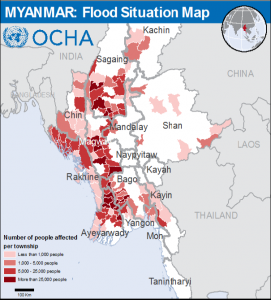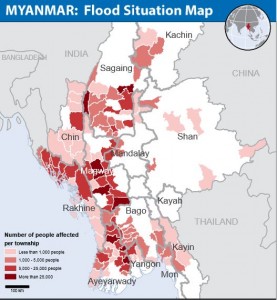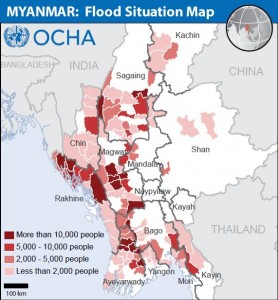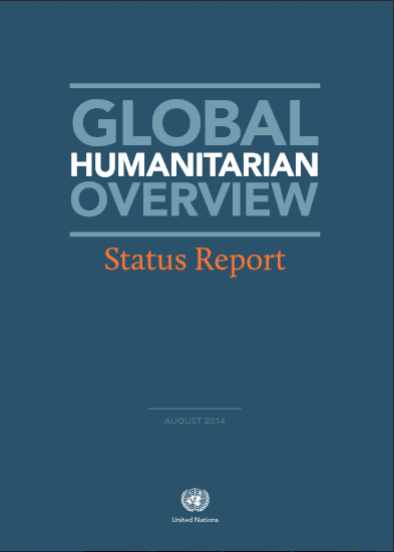Posts Tagged ‘United Nations Office for the Coordination of Humanitarian Affairs’ (7 found)
Myanmar : Floods Emergency Situation Report (No.4)
 As of 13 August, the NDMC reports that over 1,350,000 people have been severely affected by floods and landslides in July and August. This includes a cumulative number of over 297,000 households that have been or remain temporarily displaced during this period […]
As of 13 August, the NDMC reports that over 1,350,000 people have been severely affected by floods and landslides in July and August. This includes a cumulative number of over 297,000 households that have been or remain temporarily displaced during this period […]
Myanmar: Floods Emergency Situation Report ( No.3)
 As of 10 August, the National Natural Disaster Management Committee (NDMC) reports that over 1.1 million people have been severely affected by floods and landslides since mid-July. This includes a cumulative number of over 240,000 households that have been or remain temporarily displaced during this period […]
As of 10 August, the National Natural Disaster Management Committee (NDMC) reports that over 1.1 million people have been severely affected by floods and landslides since mid-July. This includes a cumulative number of over 240,000 households that have been or remain temporarily displaced during this period […]
Myanmar: Situation Report No.1 – National Natural Disaster Management Committee
Torrential rain starting from 16 July 2015 in the Northern part of Myanmar and Cyclone Komen that landfall Bengladesh has triggered severe and widespread floods and landslides across twelve states and regions in Myanmar […]
• • •Myanmar: Floods Emergency Situation Report ( No.2)
 As of 7 August, the Government of Myanmar’s Relief and Resettlement Department (RRD) reports that close to
As of 7 August, the Government of Myanmar’s Relief and Resettlement Department (RRD) reports that close to
590,000 people have been severely affected by monsoonal floods across 12 of Myanmar’s 14 states and regions
since mid-July. This includes a cumulative number of 122,200 households that have been or remain temporarily
displaced during this period. More than 17 million people live in townships that have been inundated by floods in
July and August, according to RRD. At least 96 people are confirmed to have died in the floods since June.
Global Humanitarian Overview – Status Report
2014 has seen a major surge in humanitarian crises around the world. Inter-agency strategic response and regional response plans now target over 76 million people in thirty-one countries compared to 52 million in December 2013. 102 million people are estimated to be in need of humanitarian assistance compared to 81 million in December 2013. Global financial requirements to cover humanitarian needs rose from US$12.9 billion in 2013 to $17.3 billion now. More and more crises are having a regional impact with a spill-over effect on countries which are already fragile.
Five crises have been classified by Principals of the Inter-Agency Standing Committee as “L3 emergencies”. L3s are considered to be the highest level of crisis requiring sustained, top level, system-wide support focused on leadership and coordination to improve the effectiveness of humanitarian response efforts. The response to Typhoon Haiyan in the Philippines was declared an L3 emergency in November. An estimated 11.3 million people in nine regions of the Philippines were affected by Typhoon Haiyan. At least 6,201 people were killed and the force of the storm caused widespread destruction of homes and infrastructure in many towns […]
• • •Myanmar: UN Warns Hundreds of Thousands Affected by Aid Disruption in Rakhine State
2 April 2014 – The United Nations humanitarian wing is warning that life-saving assistance to hundreds of thousands of vulnerable people in Myanmar’s Rakhine state have been seriously disrupted following the recent attacks on the UN and non-governmental organizations (NGOs)[…]
• • •Myanmar – Earthquake in Shan State (Situation Report No. 5)
On 24 March 2011, an earthquake of magnitude 6.8 on the Richter Scale and 10 km depth struck the southern parts of Shan State in the East of the Union of Myanmar (population: 3,870,921)— approximately 300 miles southeast of Mandalay […]
• • •









 All posts
All posts